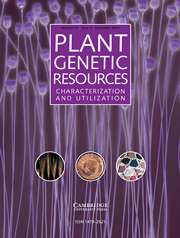Article contents
Assessment of phenotypic diversity and multi-locational screening against bean common mosaic virus (BCMV) disease resistance in dry bean (Phaseolus vulgaris L.) germplasm
Published online by Cambridge University Press: 08 July 2022
Abstract
Assessing genetic diversity and identifying trait-specific germplasm within germplasm collections is necessary for a varietal development programme. Agronomic features were investigated in 318 diverse dry bean germplasm accessions, including check varieties. We observed a lot of genetic variability for the traits studied. A wide range of variations was noticed for days to 50% flowering, days to maturity, pod length, the number of seeds per pod and 100-seed weight (HSW). For eight of the agronomic features evaluated, the analysis of variance revealed substantial differences among the accessions. For all characters, phenotypic coefficient of variation estimations were more significant than genotypic coefficient of variation. Plant height, days to 50% flowering, seed yield (q/ha) and HSW had high heritability and genetic advance as a per cent of the mean. Association analysis revealed a significant positive relationship between HSW, plant height, pod length and seed yield (q/ha). According to a hierarchical clustering analysis based on agronomic features, the diversity of dry bean germplasm has no significant association with their geographical origin. The number of pods per plant, plant height, days to maturity, days to 50% flowering and seed yield had relatively long vectors based on principal components 1 and 2, indicating that genotypes differ significantly. Additionally, the trait-specific donors and bean common mosaic virus disease-resistant accessions, IC360831, ET4515, EC150250, IC340947, IC564797B, EC565693 and ET8409 could be of value for dry bean improvement.
- Type
- Research Article
- Information
- Copyright
- Copyright © The Author(s), 2022. Published by Cambridge University Press on behalf of NIAB
References
- 4
- Cited by


